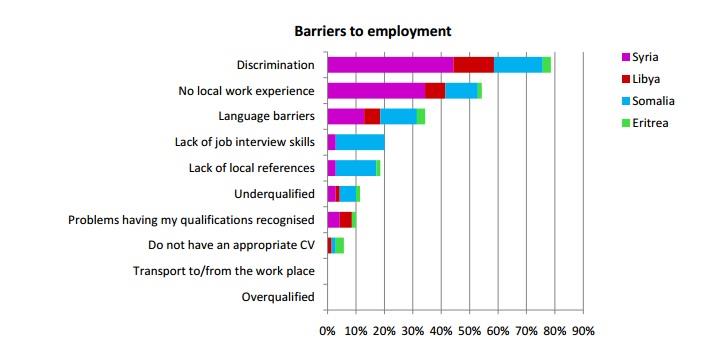Whilst there are a number of female migrants in Malta who would not like to give up their role as caregivers to their families, others have ambitions of pursuing careers and entering the country's workforce. However, according to Migrant Women Association Malta (MWAM), employment is one of the main factors which are of concern to female migrants living on the island; they are struggling to land a job, with discrimination being noted as perhaps the most obvious hurdle.
Believing that employment is the key to women's empowerment and social integration, a report published yesterday by the NGO, which was conducted in the second half of 2016, analyses the situation in more depth to further understand the issue.
Out of the women who were surveyed, a great majority (74.7%) received refugee status, 18.7% had subsidiary protection, 3.3% were beneficiaries of Temporary Humanitarian Project and 3.3% were rejected asylum seekers. The nationalities of the participants were Libyan, Syrian, Somali and Eritrean.
From the 91 women interviewed, 85.7% were unemployed. A bit less than half (45.8%) were unemployed merely because they were not able to find a job. The reasons for unemployment for the remaining number varied from not working because of other responsibilities (33.3%) to pursuing training or studies (5.6%). Therefore, the majority of women in the study were unemployed unwillingly. In fact, from those unemployed, 46.7% of participants have been searching for a job for more than a year.
More interesting to note, however, is that 93.3% of the women are literate and have attended school, with over half completing secondary education and almost 1/5 (19.8%) having obtained university degrees. Degrees vary from nursing to law, economics and business administration. In fact, although Libyan participants were the majority with the highest level of education, they were also registered with the second highest unemployment rate (92.5%).

Discrimination was noted as the main obstacle to employment, with 78.6% of respondents viewing discrimination as the biggest hurdle to finding a job. The report noted 'discrimination is not only high in the total sample, but also for each and every nation group surveyed'. Apart from the perhaps more expected 'religion', 'gender' and 'nationality' factors, 'age discrimination' was listed as the highest discriminatory factor, where the participants felt that they were discriminated for being too old or too young. The report states that only Somali women reported race and gender discrimination. It was also noted that some Syrians cited "wearing hijab" as an additional basis for discrimination.
Lack of local work experience (54.3%) was believed to be another hurdle identified, followed by language barriers and lack of job interview skills. When it comes to languages, 43.9% of respondents stated that they had a basic command of English, whilst 49.5% had a basic level of Maltese. In addition, more than half the women (54.4%) stated that if they had to develop a skill further, it would be developing languages. This shows that a high number of participants have basic knowledge of languages, and, moreover, the majority are willing to learn and improve it.
A mere 14.3% women from the study said that they were employed, mostly working in cleaning services. Other jobs included teaching, working as a hairdresser and as a shop assistant, amongst others. The majority of women in the study claimed themselves to be 'wage workers', and most reported not having a contract (73.3%). Informal employment contracts, or none at all, could potentially be an opening into the black market, with the employees not working under legal frameworks. Such situations have often been identified in the case of employing migrants in Malta.
The study was developed as part of a project called 'Stepping Up', focused on carrying out empirical research on migrant women's access to the Maltese labour market, in order to gain a basis on which to build future actions and initiatives. It was funded by the Small Initiatives Support Scheme and managed by the Malta Council for the Voluntary Sector.
"The study underlines the high unemployment rate among female asylum seekers in Malta. It also puts into perspective such a rate by calling attention to the childcare and other care responsibilities held by these women," said MWAM in the conclusion. "The research highlights that we cannot presume certain nationalities need less support to access employment. A high percentage of all the national groups surveyed would like to work but cannot find a job[..]Social integration efforts should consider the variety of skills and educational levels and cater to them appropriately."
One can view the report on http://migrantwomenmalta.org/publications/